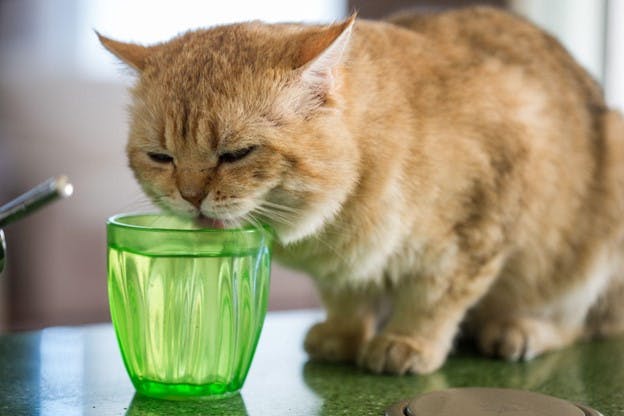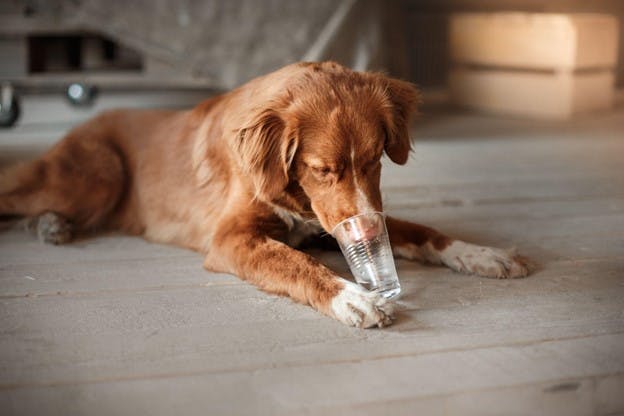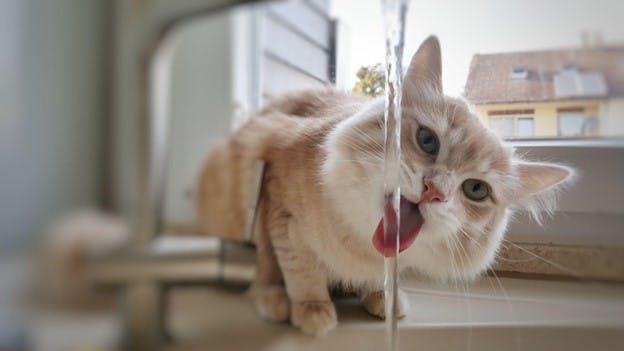June 2023
Healthy and Happy Pets: Should I Give My Dog or Cat Filtered Water?
Your little furry buddies are part of your family, so you always want to do what’s best for them. You keep them stocked with their favorite toys, go out of your way to get the food they love, and make time every day to bond with them through play or a walk. One thing that's easy to overlook is the quality of what’s in their water bowl.
Like all life on earth, your pet needs proper hydration with clean water. If your pets are going to thrive, they need a steady source of healthy water. Water helps all aspects of your pet’s health, from their organs to their coat. It helps remove toxins from their body and keeps their eyes clear and their little noses wet.
When you know that your dog will happily drink out of the toilet and your cat won’t shy away from dining on a questionable critter, it may seem a little silly to ask, “Should I give my dog or cat filtered water?” But wanting the best for your pets is sometimes making sure they get what they need and not what they would choose for themselves.
If you’re like most pet owners, you spare no expense when it comes to maintaining your pet’s health and happiness. But how important is it that you fill their water bowl with filtered water instead of tap? Should they get bottled water, or is it better for dogs and cats to drink directly from natural water sources like lakes and ponds?
In this article, we’ll answer these questions and more as we figure out if you should give your dog or cat filtered water.
Could Tap Water Be Bad for My Pet?
In general, tap water is thought to be reasonably safe for you and your pets, but there are many things you should consider when determining what water you want to give them.
Water is a universal solvent. It’s impossible to have contaminant-free water because it pulls impurities from anything it touches. The difference between what we consider clean, fresh water and water that could harm us is not the presence of contaminants but which contaminants are in it and in what concentrations they are found.
Public water supplies are treated to minimum standards of human safety, but dogs and cats have different tolerances than humans. Some things humans eat — like chocolate, onions, and garlic — could be extremely harmful to a cat or dog’s body. The same is true for drinking water contaminants. Your tap water could have contaminants that are minimally harmful to you but do more damage to your pet’s health than you know.
When you think about the fact that we are still learning about what common contaminants do to human health, it's not hard to imagine there’s a lot we don’t know about how they might affect our furry friends.
Should I Give My Dog or Cat Filtered Water?
When you consider if you should give your dog or cat filtered water, remember that fresh, home-filtered water is cleaner and has fewer contaminants than the tap water it came from. Having fewer contaminants means it has a lower chance of containing something that could be harmful to your good boy. In short, filtered water is best for your pets.
Some people believe that because dogs and cats scavenge in the wild, mimicking those conditions at home for pets is a good idea. And certain behaviors like play-hunting or getting lots of exercise, fresh air, and room to run and explore are great for your pets' health and happiness. But allowing them to drink non-filtered water because they’d drink from a puddle outside could be a mistake.
While dogs and cats will scavenge in the wild (or on the streets) for water sources, that doesn’t mean it's better for them or something you should let them do. A well-cared-for pet dog has a lifespan of around 12 years, and some dogs and cats can live over 20 years.
A stray, on the other hand, lives a much shorter lifespan. While the reasons a stray’s life may be shorter are many, drinking scavenged water can certainly play a role. Untreated water can be full of chemicals, bacteria, and parasites that can be harmful to a dog or cat’s health.
Is It Safe for My Dog or Cat to Drink Out of Puddles?
It’s best not to let your pet drink from puddles, ponds, and lakes.
Many people believe that since dogs and cats will drink from questionable sources like puddles, lakes, and streams, it's OK to let them. But if you aren’t safe drinking from a puddle, there’s no reason to believe it’s any safer for a dog or a cat. Untreated water can be full of harmful contaminants that can make your pet sick. Even a fully vaccinated pet is still susceptible to illnesses like leptospirosis, which can be fatal to your pet and can even be transferred to you.
Many freshwater bodies like lakes and ponds are also plagued with harmful algae blooms (HABs) that can release toxins and parasites like giardia. Allowing your pets to swim in or drink from these questionable water sources could cause a variety of health issues and even be fatal.
While your pet might happily drink from, or splash around in, a puddle or lake, allowing them to do it could hurt your little buddy.
What Contaminants in My Tap Water Could Hurt My Dog or Cat?
The U.S. Environmental Protection Agency (EPA) regulates tap water across the United States for safe human consumption, not pets. While it is generally accepted that drinking water that is safe for humans is also safe for pets, you should consider that your pets are a fraction of your size, so toxic build-ups could happen faster.
Potential harm from water contaminants could be more severe in smaller pets. For instance, water high in fluoride may help spare you a cavity or two, but in a dog or a cat, it can cause abnormal bone growth, teeth staining, and other problems. This is especially dangerous if you have well water which could have naturally high levels of fluoride.
But it’s not just fluoride. The negative side-effects of chlorine, lead, arsenic, and other common tap water contaminants could be more pronounced in smaller pals.
Chlorine is a common water treatment in tap water and in swimming pools. While it's likely fine in very small amounts, too much can cause vomiting and erosion of the esophagus. The smell of chlorine can also cause more finicky pets (AKA your cat) to drink less water than they should.
Lead is a neurotoxin that is considered unsafe for human consumption at any level. While most public water supplies don’t have lead, your home plumbing might.
Arsenic is a metal-like substance that’s found naturally in water. Once ingested, it can travel to many different organs before causing problems in your pet’s blood vessels. Cats are most susceptible to arsenic poisoning. Like with fluoride, being especially cautious if you have well water is a good idea.
How Do You Filter Tap Water for Dogs and Cats?
Now that you know you should give your dog or cat filtered water, how do you go about filtering it?
Just like water you’d filter for yourself, how to filter tap water for your dog or cat depends on what’s in your water. A good all-around home filter that will reduce chlorine, fluoride, lead, arsenic, and more is a filter that uses reverse osmosis technology.
If your drinking water comes from a public water supply, any high-quality water filtration system will be better than nothing.
Is Hard Water Safe for My Dog or Cat?
If you have hard water, you know how irritating it can be. You’ll deal with limescale, rust stains, clogged pipes, and skin problems, and your water-using appliances wear out more quickly. But can hard water also be harmful to your pet’s health?
It turns out it can. This is especially true in male cats and pets that are at risk of urinary tract infections and other similar problems like crystals in their urine.
Hard water has high concentrations of minerals like calcium and magnesium. While these minerals have nutritional benefits, they can also cause problems.
If you’re dealing with hard water in your home, a traditional water softener or a salt-free water conditioner can make your life easier and potentially make your water safer for your pets.
Should I Give My Pet Bottled Water?
Bottled water is perfectly safe for dogs and cats. If your pets need water and there's no other safe source, bottled water can come in handy. Whether it’s a better source than regular tap water is debatable.
The EPA regulates tap water, while the FDA regulates bottled water. What many bottled water consumers are unaware of is that the FDA’s mandate is to make sure bottled water meets the same standards as tap water. While bottled water producers spend untold sums of money marketing their products, the reality is that bottled water is usually just really expensive tap water in a plastic bottle with a brand name.
So, while it’s fine to give your dog bottled water, you’d do just as well saving yourself some money and giving them high-quality filtered tap water instead.
What Is the Best Water for Your Pets?
Your pet’s water quality is very important, but when answering the question of “Should I give my dog or cat filtered water?” you should take a few things into account. Dogs and cats are smaller than us, and therefore they could be more susceptible to the negative effects of harmful contaminants. There’s also no regulation for drinking water safety targeted at your pets' health. Giving them filtered water can reduce the risks we know about and those we don’t.
HomeWater’s made-in-the-USA water filtration systems remove and reduce a wide variety of contaminants in a cost-effective way. We have a variety of options for all different budgets and spaces.
Our Upstream 4-Stage Whole Home Water Filter can protect every faucet, hose, and sprinkler in your house from contaminants like chlorine, heavy metals, pathogens, volatile organic compounds, and more.
And our 4-Stage Reverse Osmosis Under-Counter Water Filter will give you a clean source of drinking water by reducing fluoride as well as sediment, dirt, chlorine, dissolved inorganics, barium, cadmium, hexavalent and trivalent chromium, lead, copper, radium 226/228, selenium, and nitrate/nitrite.
To find the perfect water filter for you and your pets, take our water filter quiz now.


